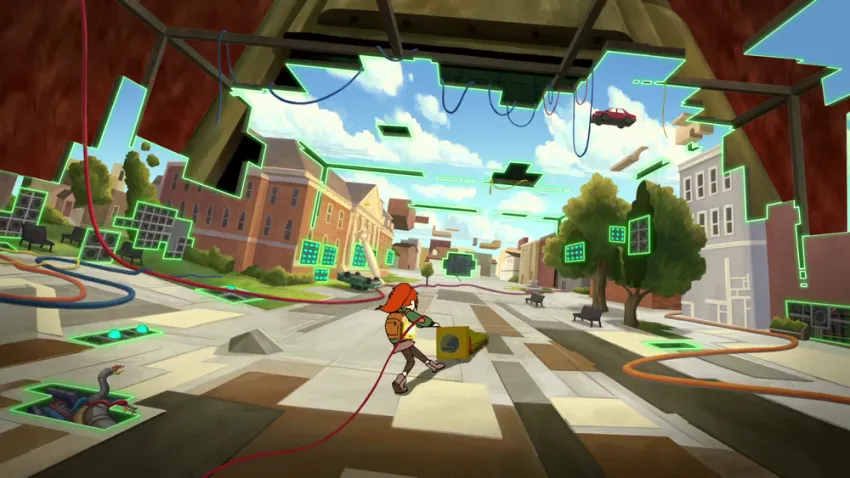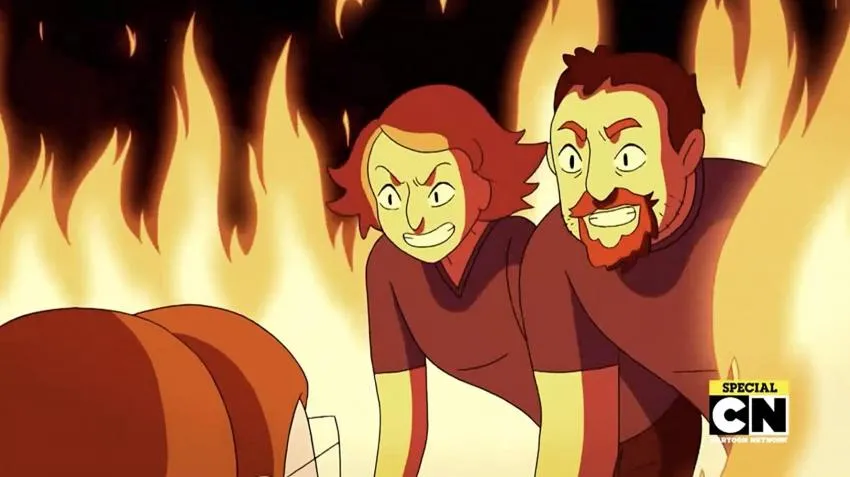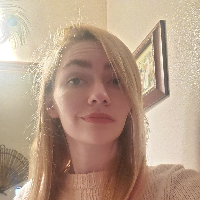Why Fans Are Clamoring To #finishInfinityTrain
The fourth season of "Infinity Train" dropped on HBOMax on April 15. There is nothing quite like this highly-rated fan-favorite series, which for the first two seasons aired on Cartoon Network before going straight to streaming. At first, the show appeared to be a miniseries like “Over the Garden Wall,” yet seasons kept getting added and told more and more of the story.
Unfortunately, however, "Infinity Train" was canceled just before the fourth season was released, long after the crew finished making it. Therefore, while working on the season the writers did not know they wouldn’t be given a chance to fully wrap up the story and answer the remaining questions about the mysterious train or certain characters.

Each season of "Infinity Train" follows different main characters. There are reoccurring side characters, and sometimes the main characters of the next season are introduced as a small piece of the season before.
Season by season the audience gets to learn a little more about the train, the conductor, and how the world within this pocket dimension works. Season one gave us the basics; passengers on the train get a glowing green number based on how much they need to learn or face their problems. Once it gets down to zero a door appears as a portal back to the real world. The person is “given an exit.”
The train is infinite because more and more cars are built and added as the trains moves. Each train car is like another dimension in and of itself, full of new characters (denizens) and another environment. There’s usually some sort of puzzle to solve in order to open a door and get to the next car. One might find a room with just one toad, or a beach world, or a western with giant bugs. The possibilities are literally infinite.

As with all seasons, the fourth season of "Infinity Train" when taken by itself is complete, and perhaps one of the best seasons. When seen as a series finale, however, it is quite underwhelming.
There are many questions surrounding the train that go unanswered. Is there an origin story for the train? Where did it come from? Who built it and why? Is Hazel going to be okay? Is Amelia ever going to get off the train?
All these unanswered questions would be fine at the end of other seasons, but now fans are left with an empty feeling.
In fact, fans organized a plan and got #FinishInfinityTrain to trend on Twitter for several hours on April 29. The topic even trended as number one for a few hours, before slowly sinking further down the list.
Show creator Owen Dennis, while not the organizer of the movement, certainly kept the momentum going. He added giveaways, with prizes as a celebration for reaching a few more hours with the topic still trending. He also, of course, kept up retweeting fans, fan art, and gave more insights about the show’s behind-the-scenes.
Over 100k tweets for #finishinfinitytrain. This is AMAZING you guys!@hbomax @cartoonnetwork pic.twitter.com/vRbtSxxbkV
— Oweeeeendennis (@OweeeeenDennis) April 29, 2021
One strength of the show… that may have also led to its cancelation, is that it’s a rare hybrid show that’s certainly watchable by children, but designed a bit more for teenagers/young adults. Its very existence is important for expanding the levels of creativity seen in the animation marketplace. The more ages that can be seen as a “target audience,” the more varied animation projects are allowed to be. That means getting to see more creativity, a wider range of characters, and executives are more likely to take a chance on high-concept untested new material.
You would think that a show full of characters getting numbers that reach zero when they learn a lesson and complete a character development arc for what problem led them onto the train in the first place would be heavy-handed and cheesy, but it really actually isn’t. It’s done so subtly and so well that each character ends up being very relatable. It’s a show that's whimsical, funny, and in several moments downright terrifying.
Basically, "Infinity Train" does a fantastic job of handling complex topics… without dumbing them down. It’s kind of the show’s whole thing.
Season one had the main character’s story arc surround her dealing with her parent's divorce. Tulip had to accept the objective reality that it sucks, confront that instead of brushing past it and stop repainting memories to be falsely happy… but you know, done in a way that kids can understand. Mentioning divorce on a kids’ network at all is rare.

There’s something magical about "Infinity Train" character development because it’s also rare to fully resolve a character arc in general without a show ends. "Infinity Train" accomplishes this by just getting new main characters.
In short, "Infinity Train" is an extremely well-done piece of media that doesn’t come around often. It’s only fair for Owen Dennis and the crew to get the finish the show in their own way, on their terms. #FinishInfinityTrain.
Opinions and Perspectives
I love how Infinity Train tackles complex themes without talking down to its audience. The way they handled Tulip's divorce story in season 1 was so authentic and relatable.
What amazes me about this show is how each season manages to feel fresh while building on the overall mystery. Such a shame we might never get answers about the train's origin.
Anyone else completely terrified by some episodes? That chrome car scene still gives me chills!
I totally agree! The show perfectly balances whimsy with genuinely dark moments. It's refreshing to see animation that isn't afraid to go there.
My heart breaks knowing we won't get closure about Amelia. Her character arc was one of the most compelling parts of the series.
The fact that it was canceled just shows how the industry still doesn't understand the value of animation that appeals to multiple age groups.
I actually think season 4 works fine as an ending. Not every mystery needs to be solved.
Strongly disagree. There are too many dangling plot threads. What about Hazel? We deserve answers!
The number system is such a brilliant metaphor for personal growth. It's simple enough for kids to grasp but deep enough for adults to appreciate.
I joined the Twitter campaign but honestly I'm losing hope. Has social media pressure ever actually saved a show?
The worldbuilding in this series is incredible. Each car feels like its own unique universe with consistent rules and logic.
You must have missed Young Justice and Clone Wars. Fan campaigns absolutely can work!
The way they introduce future protagonists as side characters in previous seasons is so clever. Makes the world feel more connected.
I've watched every episode three times and still notice new details. The attention to world-building is amazing.
Just finished binge watching all four seasons and I need more! The concept has unlimited potential.
Seeing Owen Dennis support the fan campaign gives me hope. At least he wants to finish telling the story.
The show really shines in how it portrays character growth. Each number decrease feels earned.
Am I the only one who thinks season 3 was the peak? That ending was incredible.
Not just you! Season 3 had some of the darkest moments that really pushed what animation can do.
I keep thinking about all the train cars we'll never get to see now. The possibilities were literally infinite.
The show deserves credit for never sugar coating tough issues. That's rare in animation.
I love how each season tells a complete story while adding to the bigger mystery.
We really need more shows willing to take creative risks like this.
Anyone catch all the background details hinting at the train's origin? There's so much setup with no payoff now.
The show perfectly demonstrates how animation can tell sophisticated stories for all ages.
I must have rewatched the pilot episode at least ten times. The way it sets up the world is perfect.
My kids and I watch together and we all get something different from it. That's good storytelling.


